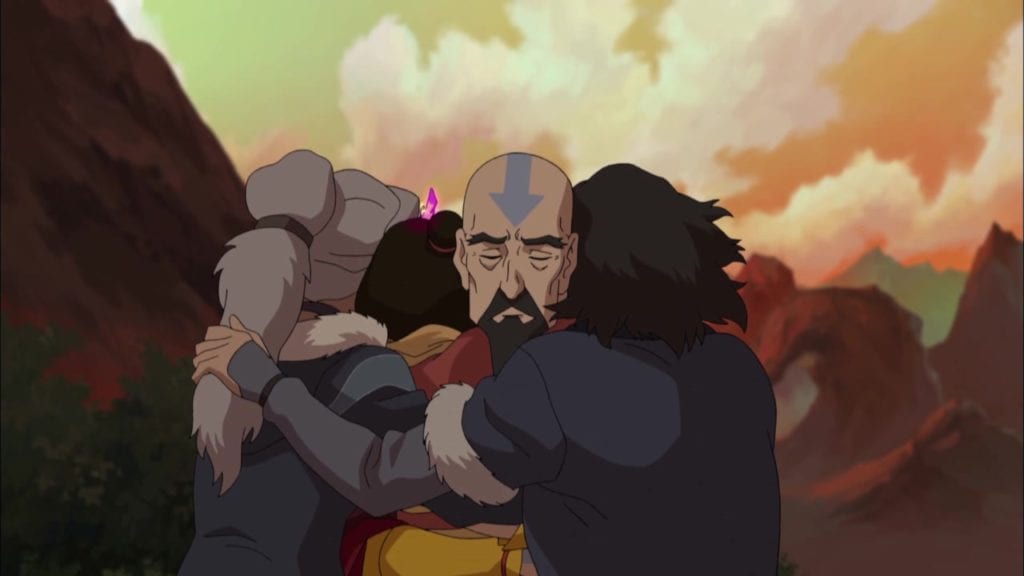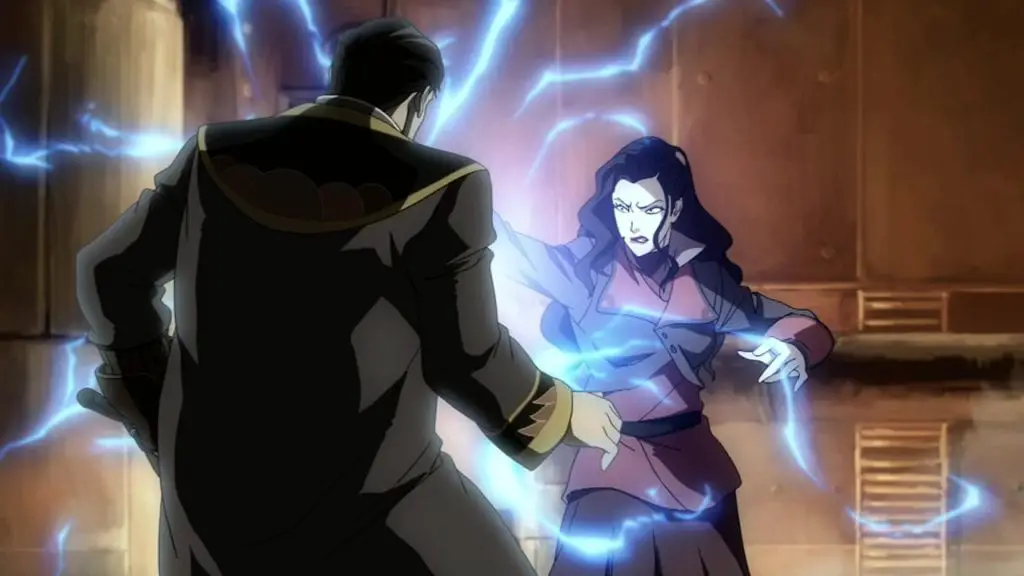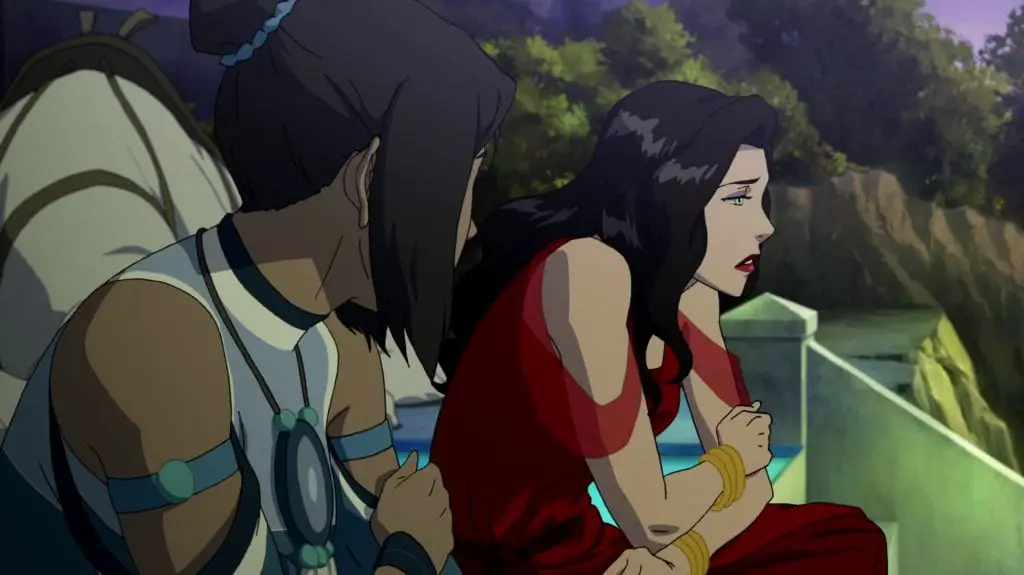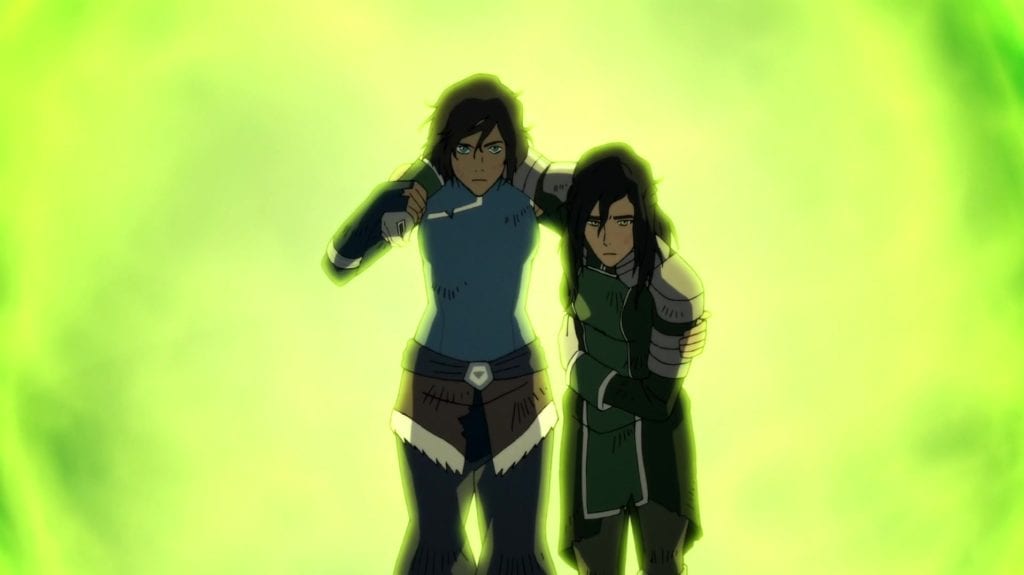Okay, two years, but we couldn’t help ourselves. Just consider it the Aftermath of a love Out of the Past; a television show that truly served as A Breath of Fresh Air and The Light in the Dark, making us more than happy to add our Remembrances.
There has been no dearth of affection for Avatar: The Legend of Korra here at The Fandomentals, even if it’s sometimes in the form of well-intentioned criticism or complete weirdness. And though this Y7 cartoon by Michael Dante DiMartino and Bryan Konietzko (Bryke) ended exactly two years ago, it’s been a narrative that’s remained with many of us, for numerous reasons.
So…we’re here to celebrate and share those reasons. In a tv-scape of grim and dark, we’d like to offer some happy, positive reflection on a show that still means a lot to us.
Kylie
A year ago I wrote that No, I’m still not over Korrasami. And no. Another year later, I’m still not over the completely organic romance between two bisexual women of color that served as the perfect thematic conclusion to the TV-show—a romance so true-to-life I felt validation in an area of my life where I didn’t even think I needed it. I will never forget grinning like an idiot, watching it unfold on my iPad in my kitchen at 6 in the morning.
But there’s plenty else I won’t forget, and plenty I keep coming back to. This was a series that gave us a healing arc for our protagonist, where PTSD was explored in a shockingly thorough and age-appropriate way. This was the show with amazing female representation: flawed women, petty women, middle-aged women with children who throw themselves into battle. It’s really rather astounding how much was put into each character, thinking about it now, even the secondary and tertiary ones.
However, for me the staying power of Korra is its self-consciousness. It’s still remarkable the way the few flaws and tired tropes were so carefully—even neurotically—subverted in the later seasons. And the way that it told a tale from a deeply considered place of empathy for each character. From Korra’s inward journey of identity and finding her place in the world, to Mako coming to put others above himself, to even Bumi reaching an understanding of his connection to his family and culture (in his 60s, no less), we were able to immediately latch onto each struggle and take something away. Heck, the final season made it a point for Korra to empathize with the series’ antagonists!
The character whose struggle I’ve found the most personally validating is Tenzin. He shed his idealized notions of of his parents, came to understand the value of himself separate from that legacy, and empowered both Korra and his children to reach their own heights. As a young adult, the experience of viewing my upbringing and relation to family in a new light is ever-present, and seeing Tenzin go through the same steps (without everything magically getting fixed, too!) is so continually comforting that it’s hard for me to put it into words.
Korra is simply thoughtful. And it’s a show that gives back as much as you put in, with almost no limit to its complexity. I speak from experience. (Challenge: name every pair of literary foils from the final season!) It will be some time before another piece of media touches me so closely.

Bo
I was a latecomer to the Avatar franchise. My brothers nagged me for years to watch Avatar: The Last Airbender. One summer I finally caved in and gave it a shot. Over the course of about a week-and-a-half I devoured one of the 5 best shows I have ever seen. That just happened to be the same summer that Book 3 of The Legend of Korra began. I was nowhere near ready to leave Avatar behind, so naturally I jumped right into Book 1 of this sequel show, not really knowing what to expect. Just the general opinion floating around that while it was okay, The Legend of Korra was no The Last Airbender.
December 19 of that same year saw the iconic ending of Korra and Asami entering the Spirit Portal, and I feel like my TV-loving brain never moved on from it. I am of the opinion that Korra is a lesser show than its predecessor. Its Team Avatar was weaker. Its plot rougher and lacking the incredible focus of Avatar: The Last Airbender. The overall quality of the fight scenes fell short. Did this matter much? Not really, because of the reasons it fell short. Plainly, Bryke tried something more ambitious and outside their comfort zone. This made for a weaker product overall, but something absolutely incredible when it finally hit its peak. And what a peak it was.
Most of this is owed to Korra herself, who not only matches Aang as a main character but surpasses him. Whatever the lows of the first two Books, Korra made it easy to bear. She’s different. She’s engaging. Her struggles are so real and done so well. Her triumphs make me cheer. Her failures make me cry. Korra’s journey had me invested every single step of the way. I’ve seen a great number of TV protagonists in my life. I’m not sure any made me care the way Korra did.
There are many great things to remember The Legend of Korra for. For me, it’s Korra herself. It’s a show (and franchise) I never expected, and one I will always miss.
Gretchen
It’s hard to choose just one thing about Legend of Korra with resonance. With so many tone-deaf producers and screenwriters these days, show runners that are willing to listen to their fans and characters about what’s not working, and course correct, feels as groundbreaking as it was then. I’m grateful for Bryke’s example in how to respond to fans and change one’s vision for a show.
More than anything, I’m grateful for the characters. As I get older, the more I’m impressed by a youth programming that grants older characters the same weight and humanity as it’s young protagonists. Tenzin, Bumi, Lin, Suyin—even Pema and Kya feel just as nuanced as Korra. Some of them even more so than Mako and Bolin. It helps that I relate to their struggles and am an adult myself (well, am trying to be one). Sibling issues? Check. The weight of regret and guilt that comes with letting others down? Check. Complicated relationships with friends and former lovers? Check. Fraught relationships with parents? CHECK.

Family dramas are my thing, especially if there’s a healthy dose of found family to balance out the blood family tensions. I love it and it means so much to me to see older characters struggling (some of them still struggling) with the same things the younger ones do, because it gives me hope that I don’t have to have it all figured out just yet. It’s the bittersweet pang of characters I relate to in the most punch me in the face way. Also, Asami’s life sucks and it hurts me, but she gets Korra in the end so yay.
Griffin
Catharsis. Catharsis and validation. I’ve no doubt that many of my colleagues here are saying the same, but that’s part of the beauty. That’s a big reason why The Legend of Korra was, and continues to be, something truly remarkable.
As someone who struggles with mental illness, PTSD among them, watching Korra learn how to cope with her trauma, to not let it define or control her or seek out, God forbid, a “cure”—before seeing that, a part of me still believed it was “all in my head”. That it was just me making excuses and lying. But, little by little, week by week, it solidified. Seeing it made it feel real, because it was.
In fact, I’m one of the people that strongly identified with Korra’s own internal justification for her pain. For so many, giving suffering a purpose is necessary to finding some sort of peace or closure. Yes, that line was worded problematically, but I fixed it so we’re all good.
Before the finale was posted online, I prayed. Prayed harder than I had in a long time. Burning bush, the whole shebang. Some part of me knew just how desperately I needed Korra and Asami to be real. For that relationship to exist. Because if it did, my own queerness (I was already out to some friends and family) could not possibly be a mistake, or a lie, or, once again, “all in my head”. What I was feeling, what I said I was feeling, it would be legitimate. Real. Valid.
Cut to gross sobbing for two solid hours, followed by just over a year and 240k words.
At the time, two years ago, I was dealing with a lot of rage at basically everything. Seychelle Gabrielle’s reading of Asami’s final lines, that she was “able to forgive him” sounded so hollow to me, and writing that story honestly helped me work through my own bottle up anger far more than I ever expected.

But, most of all, and far more importantly than all of that it was, heh, the friends I made along the way. Fandom can be harsh and cruel and full of hatred. See: Mass Effect. And while I did see my fair share of that in the Korra fandom, I also made quite a few life-long friends. Relationships built from our mutual love of this show and everything it represents.
S’how I met Kylie, one of our Managing Editors. Weird, right?
Jordan
Milan
Blind to my own naiveté and arrogance, I approached Avatar: The Last Airbender expecting it to be little else than a cartoon everybody around me liked. I was pretty convinced of its levity at first, but a couple of episodes in, I saw a bold and sincere departure from the simple-minded, Manichean writing and aesthetics I’d come to expect from most animated series. First season in, the story narrated by Katara at the start of every episode became engraved in my being. Second season done, my fondness for the characters reached unspeakable heights. Third season and the series finished, Avatar: The Last Airbender was a masterpiece in my eyes.
When I first caught word about The Legend of Korra as a continuation of the mythos, I experienced as much curiosity as dread. I asked myself whether this new series could live up to its predecessor. Once again, I was naive and arrogant, for I was asking a hollow question that needed no answer. The adversities the prodigy of the Water Tribe had to conquer were far different from the trials of Aang. Korra carried herself as an entirely different person; as one who sought to escape the grand shadow cast by our cherished Airbender, all the while dealing with the inherent troubles of her era.
But she showed us, didn’t she? She showed us, when in hindsight, she never really needed to. If you were to ask me which series I like better now, I honestly could not tell you—and that is not even the point anyway. The Legend of Korra was its own thing, walking its own path, with boldness, sincerity, and also outstanding soberness. The thematic plunge the final season took into fearsome depths prepared us for the consummation of the series’ intent (as how I perceive it, anyway). The finale gave us that soaring moment when it became undeniable: Korra owns her time, as Aang did with his. There’s no need for comparison, only for ovation.

Nick
Korrasami was my first true foray into shipping fandom. I’d read some fics before and even had some pairings, but I never took them seriously. In fact, I initially didn’t take Korrasami seriously at all. Yet eventually it went from being a crackship to an actual OTP that shocked me by being cannon.
My story begins in 2014. I had a ritual of reading the Avatar subreddit and watching the show after my college math class. Korra was the perfect relaxer. The player Nickelodeon used was terrible, and the buffering took forever. Yet it was still worth it to watch this amazing show.
Korrasami was, at first, a crackship for me. I thought it would never happen. That this show would never go there. The idea that a mainstream animated show would have a canon wlw pairing seamed nigh impossible to me. However, despite my trepidation, I found myself more and more wanting this pairing. Whether it was “Slyfox00’s” (one of reddit’s premier Korrasami shippers) constant hope that it would happen, or Kylie’s analyses, or the weird shipper moments on the actual show, I slowly found myself routing and routing for this pairing, regardless of I what I though of the reality surrounding it.
And it all finally coalesced in the season finale. Korra and Asami touched hands, and stared into each others eyes, and I felt something. I felt like, yes, they are together. They are a couple, they are canon. I instantly went on the subreddit to gauge others’ reactions. Many took it as confirmation, many saw that and said “no, they aren’t a thing”, and then the people like me who felt like it was canon, but very unsure. Was it meant to be ambiguous, was it not canon? Debates and discourse went on for days. It completely overshadowed other discourse as people wondered what it meant.
Then Bryan and Mike their statements. Discourse further went on to explore what is canon, whether they were pandering, if it was all fake. Eventually people realized, that it wasn’t fake. It was canon, and it had been seeded very well. (Maybe even unintentionally.)
Korrasami was a miracle. Its a miracle the creators made it a thing, it’s a miracle the entire cast joined in, and its a miracle it ever made it to the actual show. Now, 2 years later, I remember it as something amazing, and wondering if I can give justice to just how big and beautiful it was. From Crackship to OTP, it was one wild ride.
Sibylle
Szofi
I was lucky enough that the Avatar franchise accompanied my teenage years, a huge part of me growing up. The fact that it’s been 2 years since the finale of The Legend of Korra seems surreal, but for me it’s mostly because it seems longer than that. It had such a huge impact on multiple levels that it’s hard to believe it’s only been that long.
On a personal level, the Avatar franchise in general still means the same to me as it meant 2 or 8 years ago. I still firmly believe that it’s the most wonderful piece of Western Animation, and I would argue that it’s also one of the best television shows of all time, live action included. But in a way it also means something different, because let’s be honest, who hasn’t been changed by the final 2 minutes of Korra.
I don’t want all of this to be about Korrasami, because that’s just one part of a show that I love every bit of, but it is a huge part and I feel like its part of the legacy left behind by the franchise, so I have to at least mention it. It was undeniably a huge moment for Western Animation, and children’s programming, and I was shaking with joy.
I guess what Korra means to me 2 years after the end is that it’s still an endless source of entertainment and food for thought. I think it will continue to be meaningful decades after it first came out; it’s just one of those worlds that you can’t leave behind once it properly sucked you in. 2 months, 2 years, 2 decades, it doesn’t really matter, Korra is still as important as ever.
We’re all curious to know if/how Korra has stayed with you guys over the past couple years as well. Let us know in the comment section, though whatever you have to say sounds perfect to us.

